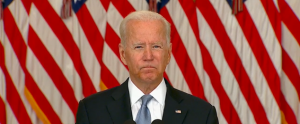
13 April 2020. ABC News: Now that his once-hoped-for goal of reopening the country by Easter has come and gone, President Donald Trump has set his sights on May 1 as a target date as he moves to launch an economic-focused council to tackle what a reopening amid the coronavirus pandemic would look like.
At the same time, on Monday he claimed he has power over the nation’s governors in setting the terms of any reopening in individual states.
The president has referred to the looming reopening decision as the “toughest” he’s faced in his presidency and told Fox News over the weekend that it will be based on a combination of facts and personal “instinct.”
“Whether we like it or not, there is a certain instinct to it. People want to get back to work. We have to bring our country back. So, I’ll be making a decision reasonably soon,” Trump said in an interview on Saturday night.
But as governors maintain they will have the final say over their states, Trump, who has pledged to strongly weigh the advice of his health experts against economic concerns, is now asserting the decision is up to him.
“For the purpose of creating conflict and confusion, some in the Fake News Media are saying that it is the Governors decision to open up the states, not that of the President of the United States & the Federal Government. Let it be fully understood that this is incorrect. It is the decision of the President, and for many good reasons. With that being said, the Administration and I are working closely with the Governors, and this will continue. A decision by me, in conjunction with the Governors and input from others, will be made shortly!” Trump tweeted Monday morning.
….It is the decision of the President, and for many good reasons. With that being said, the Administration and I are working closely with the Governors, and this will continue. A decision by me, in conjunction with the Governors and input from others, will be made shortly!
— Donald J. Trump (@realDonaldTrump) April 13, 2020
Beyond the legal questions surrounding Trump’s asserted right to override state powers, the president’s claim comes after he has for weeks deferred to the governors and mayors to make decisions based on what’s right for their specific communities.
The president is now turning the tables as he seeks to take control over when their economies should open despite questions about the constitutionality of any such decision.
Many of the governors have expressed that they will be making the decision to reopen their states based on the data for their communities. New York Gov. Andrew Cuomo. a Democrat, on Monday said that he will be joined by other governors in the region to announce a “geographically coordinated” reopening plan.
“To the extent we can coordinate, we should and we will,” Cuomo said.
Decisions on what a nationwide recommendation for reopening would like like will likely come from the president’s soon-to-be-announced “Opening Our Country Council” — what Trump said Friday he said he might call the effort.
The new council, which would be distinct from the already-existing public health-focused coronavirus task force, will have an economic focus and include, according to the president, “some of the most distinguished leaders in politics, business and medical.”
The president, when discussing the potential members of the council, signaled that group would be bipartisan commending the work of some Democratic governors across the country.
Experts weigh in on reopening the country
For all their public disagreements, the idea of a gradual reopening beginning next month is one that even the government’s top infectious disease expert Dr. Anthony Fauci has said may be realistic.
Fauci said on Sunday that it was conceivable that parts of the country could safely reopen on a “rolling” basis beginning in May.
“I think it could probably start at least in some ways maybe next month,” Fauci said Sunday on CNN’s “State of the Union.” “We are hoping by the end of the month we can look around and say, ‘OK, is there any element here that we can safely and cautiously start pulling back on.’ If so, do it. If not, then just continue to hunker down.”
Even as there have been signs of hope from top officials in recent days that the United States has made progress in slowing the spread of the virus and a slowdown in hospitalization rates, public health experts have also warned about the risk of prematurely relaxing social distancing.
Experts have cautioned that without mass testing across the country — to both identify who has the virus and those who have demonstrated immunity despite exposure — the U.S. is at significant risk of a second wave of cases.
President Trump has brushed off the necessity of widespread testing, saying it would be a “nice thing” but is by no means a requirement.
“Do you need it? No. Is it a nice thing to do? Yes,” Trump said. “We’re talking about 325 million people, and that’s not gonna happen, as you can imagine.”
One report from the American Enterprise Institute suggested the U.S. would need to conduct 750,000 tests a week – a number based on the number of medical visits during flu season. Another report, from Harvard University’s Safra Center for Ethics, suggested millions of tests a day would be needed to aggressively track the virus and keep the infection rate low.
“We’re not there yet,” said Dr. Caitlyn Rivers, a senior scholar and assistant professor at the Johns Hopkins Center for Health Security, who authored the AEI report with a group of public health experts, including former FDA Commissioner Scott Gottlieb.
Trump striking back at news report on warnings
As the president now weighs the feasibility of moving forward with the prospect of how to reopen the country while addressing the ongoing health emergency, he also finds himself on the defensive after the New York Times reported that he didn’t heed early and repeated warnings about the virus coming from Health and Human Services Secretary Alex Azar and others within his administration dating back to January.
“The @nytimes story is a Fake, just like the ‘paper’ itself. I was criticized for moving too fast when I issued the China Ban, long before most others wanted to do so,” he tweeted.
The president also fueled questions of Fauci’s fate after retweeting to his 77 million followers a critic who suggested that Fauci should be fired after he said that if the White House has acted faster, more lives could have been saved.
“It’s very difficult to go back and say that. I mean, obviously, you could logically say that if you had a process that was ongoing and you started mitigation earlier, you could have saved lives. Obviously, no one is going to deny that. But what goes into those kinds of decisions is complicated,” Fauci said in an appearance on CNN which prompted this tweet from a former Republican congressional candidate.
“Fauci is now saying that had Trump listened to the medical experts earlier he could’ve saved more lives,” wrote DeAnna Lorraine, who was unsuccessful in challenging House Speaker Nancy Pelosi in an open primary in the San Francisco-area district.
Her tweet went on: “Fauci was telling people on February 29th that there was nothing to worry about and it posed no threat to the US public at large. Time to #FireFauci…”
While the president did not repeat those sentiments himself, in his retweet he did not push back against those claims instead saying, “Sorry Fake News, it’s all on tape. I banned China long before people spoke up.”
The tweet by Lorraine claimed that Fauci told the American people on Feb. 29 that “there was nothing to worry about and it posed no threat to the US public at large.” However, that is a mischaracterization of what the director of the National Institute of Allergy and Infectious Diseases said in the White House coronavirus task force briefing.
While Fauci did say that the risk to the American people remained low at that point in time, he emphasized that this is an “evolving situation” and that the country should “prepare for further challenges.”
“With regard to the particular area that’s involved now in Washington, the country as a whole — because we get asked that all the time — still remains at low risk,” Fauci said. “But when we say that, we want to underscore that this is an evolving situation.”
He added, “But as we say this, we need to prepare for further challenges. And we will have them.”




